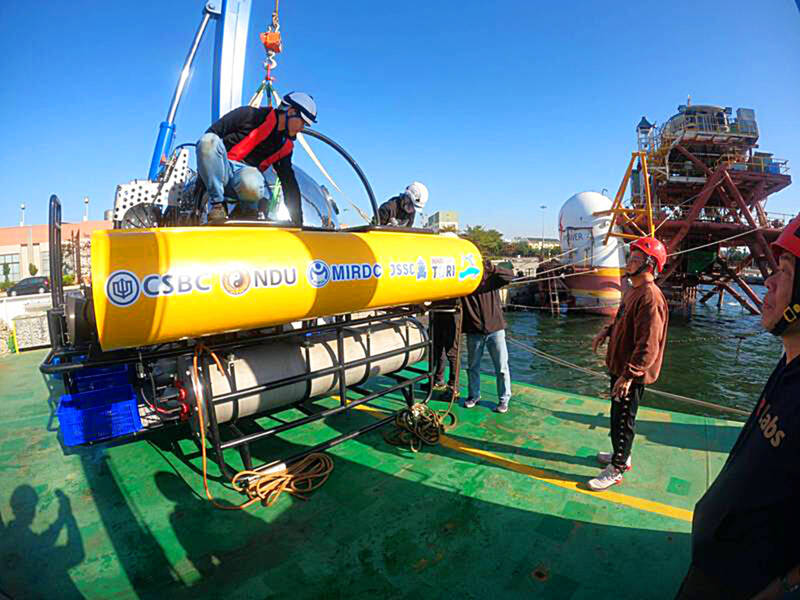Five national universities are expected to establish six research centers in areas of national focus as part of the Ministry of Education’s goal of attracting international talent and supporting local academics to improve Taiwan’s academic competitive edge internationally.
The centers will begin attracting students in the upcoming semester, starting in August, the ministry said.
The project is expected to cost about NT$300 million (US$10.02 million) annually and each center developed would receive NT$50 million in funding, Department of Higher Education Director-General Liao Kao-hsien (廖高賢) said.

Photo courtesy of the National Sun Yat-sen University Underwater Vehicle R&D Center
National Taiwan University President Chen Wen-chang (陳文章) said the university would establish two centers focused on artificial intelligence (AI) and advanced biomedicine.
The university also plans to invest NT$5 million per year, Chen added.
National Tsing Hua University Vice President Tai Nien-hua (戴念華) said that their university’s center would specialize in quantum technology, a crucial part of future technological development, with applications spanning physics, materials science, information engineering and mechanical engineering.
National Cheng Kung University President Shen Meng-ru (沈孟儒) said the university’s center would focus on medicine, electronics and engineering, especially on adapting cutting-edge technology for clinical use.
National Sun Yat-sen University President Lee Chih-peng (李志鵬) said that their center would concentrate on marine technology development, as it hopes to bring the nation’s marine technology up to par with the EU, the US and Japan, and open a new market for Taiwanese industries.
National Yang Ming Chiao Tung University President Lin Chi-hung (林奇宏) said that the university’s center would specialize in AI development.
A deeper understanding of cloud and edge AI applications would enable better utilization of technology for industrial development, while also ensuring that Taiwan leads future developmental trends, he said.
Separately, the ministry said it would be providing additional subsidies to departments in twelve universities with exceptional performance.
To encourage universities to work toward being listed among the world’s top 100 universities, the ministry is providing NT$20 million in subsidies to departments that are mentioned in the top 50 on EQ, THE or ESI rankings, it said.
Departments and schools listed from 51 to 100 are also eligible to receive NT$10 million in additional funding.
Chen said the subsidies would help departments advance further in the world rankings.
On the other hand, Tai said that the move, despite its good intentions, was not without its blind spots, and urged the ministry to allow the universities to participate in deciding the criteria.

Right-wing political scientist Laura Fernandez on Sunday won Costa Rica’s presidential election by a landslide, after promising to crack down on rising violence linked to the cocaine trade. Fernandez’s nearest rival, economist Alvaro Ramos, conceded defeat as results showed the ruling party far exceeding the threshold of 40 percent needed to avoid a runoff. With 94 percent of polling stations counted, the political heir of outgoing Costa Rican President Rodrigo Chaves had captured 48.3 percent of the vote compared with Ramos’ 33.4 percent, the Supreme Electoral Tribunal said. As soon as the first results were announced, members of Fernandez’s Sovereign People’s Party

MORE RESPONSIBILITY: Draftees would be expected to fight alongside professional soldiers, likely requiring the transformation of some training brigades into combat units The armed forces are to start incorporating new conscripts into combined arms brigades this year to enhance combat readiness, the Executive Yuan’s latest policy report said. The new policy would affect Taiwanese men entering the military for their compulsory service, which was extended to one year under reforms by then-president Tsai Ing-wen (蔡英文) in 2022. The conscripts would be trained to operate machine guns, uncrewed aerial vehicles, anti-tank guided missile launchers and Stinger air defense systems, the report said, adding that the basic training would be lengthened to eight weeks. After basic training, conscripts would be sorted into infantry battalions that would take

GROWING AMBITIONS: The scale and tempo of the operations show that the Strait has become the core theater for China to expand its security interests, the report said Chinese military aircraft incursions around Taiwan have surged nearly 15-fold over the past five years, according to a report released yesterday by the Democratic Progressive Party’s (DPP) Department of China Affairs. Sorties in the Taiwan Strait were previously irregular, totaling 380 in 2020, but have since evolved into routine operations, the report showed. “This demonstrates that the Taiwan Strait has become both the starting point and testing ground for Beijing’s expansionist ambitions,” it said. Driven by military expansionism, China is systematically pursuing actions aimed at altering the regional “status quo,” the department said, adding that Taiwan represents the most critical link in China’s

‘REALLY PROUD’: Nvidia would not be possible without Taiwan, Huang said, adding that TSMC would be increasing its capacity by 100 percent Nvidia Corp CEO Jensen Huang (黃仁勳) on Saturday praised and lightly cajoled his major Taiwanese suppliers to produce more to help power strong demand for artificial intelligence (AI), capping a visit to the country of his birth, where he has been mobbed by adoring fans at every step. Speaking at an impromptu press conference in the rain outside a Taipei restaurant, where he had hosted suppliers for a “trillion-dollar dinner,” named after the market capitalization of those firms attending, Huang said this would be another good year for business. “TSMC needs to work very hard this year because I need a lot